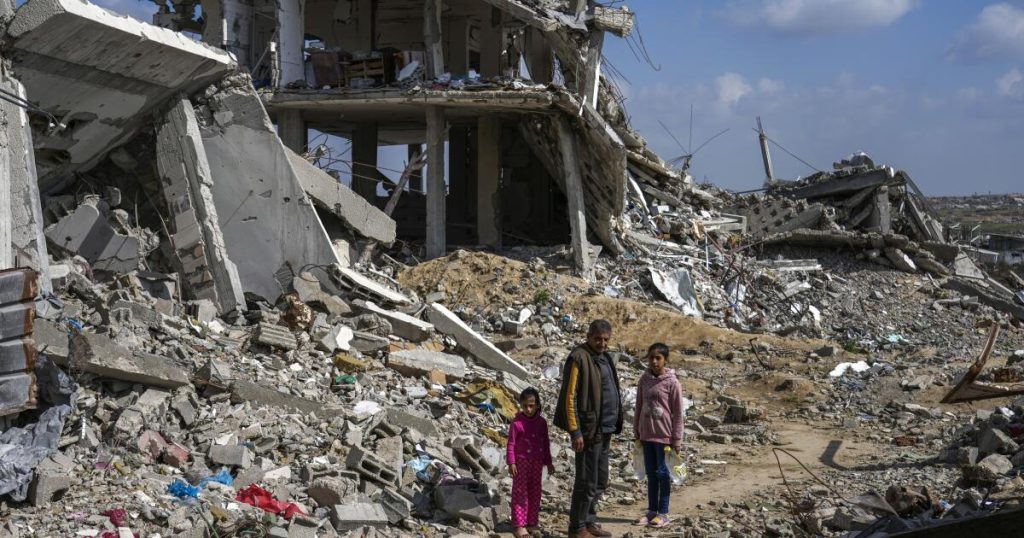The situation in Gaza has reached a critical juncture, with Egypt leading an ambitious initiative to rebuild the war-torn territory while ensuring the Palestinian population remains in their homeland. This plan is a direct response to U.S. President Trump’s controversial proposal, which called for the depopulation of Gaza and its takeover by the United States. Trump’s plan, which has been met with widespread condemnation, envisaged transforming Gaza into a “Riviera of the Middle East” without allowing Palestinians to return. Egypt’s proposal, on the other hand, prioritizes the welfare and rights of Gaza’s residents, offering a counter-narrative that emphasizes reconstruction, security, and self-governance without displacement. The plan is currently being negotiated with European diplomats and Arab nations, including Saudi Arabia, Qatar, and the United Arab Emirates, and is expected to be presented at an upcoming Arab summit.
At the heart of Egypt’s initiative is the establishment of “secure areas” within Gaza where Palestinians can live safely while reconstruction efforts are underway. These zones would serve as temporary solutions during the initial phases of rebuilding, equipped with mobile housing, shelters, and humanitarian aid. Egyptian and international construction firms would oversee the removal of rubble and the rehabilitation of Gaza’s infrastructure, which has been devastated by years of conflict. The reconstruction process is expected to take up to five years and would provide tens of thousands of jobs for Gaza’s population, offering a glimmer of hope for economic recovery. Egypt’s plan also includes the creation of a Palestinian administration to oversee the reconstruction efforts, one that is not aligned with either Hamas or the Palestinian Authority. This political framework is designed to ensure stability and independence, with a Palestinian police force composed of former Palestinian Authority personnel and reinforced by Egyptian- and Western-trained forces.
The international community has largely rejected Trump’s proposal, with European countries and rights groups denouncing it as a form of forced expulsion, which could amount to a war crime. Palestinian leaders have also made it clear that they will not leave their homeland, and Arab nations like Jordan and Egypt have refused to absorb Gaza’s population. Israel, however, has embraced Trump’s plan, with Prime Minister Benjamin Netanyahu praising the idea and stating that Israel is preparing to implement it. Netanyahu has rejected any role for Hamas or the Palestinian Authority in governing Gaza, leaving the question of long-term governance unresolved. Hamas, for its part, has expressed willingness to step aside, with spokesman Abdul Latif al-Qanou hinting at the possibility of a unity government or a committee of technocrats to run the territory.
Egypt’s proposal has gained traction in part because it addresses the urgent need for reconstruction in Gaza, where the humanitarian crisis is dire. Israel’s 16-month military campaign, which began after a devastating attack by Hamas in October 2023, has left Gaza in ruins. According to United Nations estimates, over 250,000 housing units have been destroyed or damaged, and more than 90% of the roads and 80% of health facilities have been rendered inoperable. The economic toll is staggering, with infrastructure damage estimated at $30 billion and housing losses at $16 billion. Any reconstruction plan will require a lasting cease-fire and a political agreement on Gaza’s future governance. The first phase of the current cease-fire is set to expire in early March, and negotiators are racing to reach a deal that would secure the release of hostages held by Hamas, ensure Israel’s withdrawal, and halt the conflict in the long term.
Egypt’s efforts to develop a counterproposal to Trump’s plan have been supported by European countries like France and Germany, which have expressed interest in an Arab-led solution. Egyptian President Abdel Fattah el-Sissi has personally discussed the initiative with French President Emmanuel Macron, and Egyptian Foreign Minister Badr Abdelatty has briefed European Union officials on the sidelines of the Munich Security Conference. Arab nations, including Saudi Arabia, Qatar, and the United Arab Emirates, are also actively involved, with officials set to meet in Riyadh to finalize the proposal before presenting it to the Arab League. The plan’s success, however, will depend on securing international funding and political buy-in, as well as addressing the deeply entrenched divisions between Hamas and the Palestinian Authority.
In many ways, Egypt’s plan represents a beacon of hope in a region beset by conflict and division. By prioritizing the rights and dignity of Gaza’s population, the initiative offers a stark contrast to Trump’s vision of displacement and occupation. Yet, the road ahead is fraught with challenges, from securing a lasting cease-fire to navigating the complex web of political rivalries and competing interests. For the people of Gaza, who have endured unimaginable suffering, the possibility of rebuilding their homes and their lives is a testament to the enduring resilience of the Palestinian spirit. Whether Egypt’s plan can pave the way for a more just and peaceful future remains to be seen, but one thing is clear: the fate of Gaza will not be decided without the voices and aspirations of its people.
